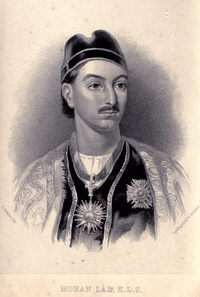Mohan Lal Kashmiri
Mohan Lal Zutshi KLS[1] (popularly known as Mohan Lal Kashmiri; 1812 – 1877) was an Indian traveler, diplomat, and author. He played a central role in the First Anglo-Afghan War of 1838–1842. His biography of Dost Mohammad Khan, the emir of Kabul, is a primary source on the War.
Mohan Lal Zutshi | |
|---|---|
 | |
| Born | 1812 |
| Died | 1877 |
| Occupation | traveller, spy, diplomat, and author |
His wife Hyderi Begum was a Muslim scholar. During the Indian Mutiny in 1857, she maintained a day book recording the happenings and events in Delhi. Her diary was later seized and confiscated by the British government.
Mohan Lal Zutshi retired at the age of 32, disappointed that he had not been properly rewarded for his singular contributions to the British cause in the First Anglo-Afghan War. His only brother, Kedar Nath Zutshi, who was a Deputy Collector in Ambala, Panjab Province died in 1855. Zutshi's later years were spent in obscurity and financial troubles. He is believed to have written an extensive diary, but it has disappeared.
Anglo-Afghan war
In 1831 Lieutenant (later Captain) Sir Alexander Burnes of the East India Company's service was deputed by the British Government to gather information in the countries lying between India and the Caspian. He was directed to appear as a private individual with a small retinue maintaining a character of poverty. Zutshi was engaged by Burnes primarily to assist him in his Persian correspondence and also because Burnes believed that his youth and creed would free him from all danger of his entering into intrigues with the people among whom he was going to travel.
Alexander Burnes and Mohan Lal Zutshi led an expedition to Central Asia in 1832-4 for procuring political and military intelligence and became firm friends. Later, Zutshi was the Commercial Agent for the British on the Indus and Political Assistant to Burnes in Kabul during the first Afghan War. Unlike Burnes, he survived the massacres of 1841 and continued to keep Calcutta informed of events in the Afghan capital from the house of a merchant where he had taken refuge. His reports contained many strong and cogent criticisms of the behaviour of British Officers, and particularly Sir William Hay Macnaghten and General William Elphinstone.
Zutshi had learned Persian in Delhi and travelled in the garb of a Muslim, under the pseudonym of 'Aga Hassan Kashmiri' or as 'Mirza Quli Kashmiri' in Persia and Afghanistan collecting information vital for his British superiors. During the First Anglo-Afghan war, he was instrumental in setting up and expanding the British intelligence network in Afghanistan and is also alleged to have had a major hand in arranging the assassination, by poisoning, of Mir Masjidi Khan, a major Afghan resistance leader.[2] He found out and handed over to the British authorities secret letters written by the rulers of Kandahar to Mehrab Khan, the ruler of Baluchistan, exhorting him not to allow passage to the invading British army. He managed to obtain the services of very important functionaries like Mohammed Tahir, Haji Khan Kakari, Abdul Majeed Khan, Akhundzada Ghulam and Mullah Nasooh in Kandahar and Sardar Abdul Rashid Khan, a nephew of the Emir Sardar Dost Mohammad Khan in Ghazni. He played a major role in securing the release of British prisoners held hostage in Bamiyan. He tried to bring peace between the British and the Afghans during such inflammatory situations.
Photograph
During his travels in Europe Mohan Lal was photographed in 1844 by Robert Adamson and David Octavius Hill.[3] Today his photo is contained in the Scottish National Portrait Gallery.[4]
Works
- Lal, Mohan. Journal of a tour through the Punjab, Afghanistan, Turkistan, Khorasan and part of Persia in company with Lt Burnes, and Dr Gerard (Calcutta, 1834).
- Lal, Mohan. Travels in the Panjab, Afghanistan, & Turkistan, to Balk, Bokhara, and Herat; and a visit to Great Britain and Germany (London: Wm. H. Allen & Co., 1846). Reprinted (Lahore: Al Biruni, 1979).
- Lal, Mohan. Life of the Amir Dost Mohammed Khan, of Kabul: with his political proceedings towards the English, Russian, and Persian governments, including victory and disasters of the British Army in Afghanistan. (London: Longman, Brown, Green and Longmans, 1846).
Further reading
- Alexander Burnes. Travels into Bokhara. Volume 1.
- Mir Ghulam Mohammed Gubar. Afghanistan in the course of History [Persian]. Second Edition, Qum, Iran, Published 1359 [1979-80] pp. 454, 550.
- Hari Ram Gupta. Life and Work of Mohan Lal Kashmiri (Lahore: Minerva Book Shop, 1943).
- Victoria Schofield. Afghan Frontier: Feuding and Fighting in Central Asia (London: Tauris Parke, 2003), ISBN 1-86064-895-9, ISBN 978-1-86064-895-3.
References
- "Travels of Mohan Lal". Tait's Edinburgh Magazine. 13: 308. 1846.
- Lady Florentia Sale, Journal of the Disasters in Afghanistan, 1841-42, 1843, p.141
- "Mohun Lal, aged 28 in 1844". Flickr. Archived from the original on 25 January 2014. Retrieved 13 July 2020.
- "Portrait of Mohun Lal, Edinburgh October 1844". National Galleries of Scotland. Archived from the original on 12 July 2020. Retrieved 13 July 2020.
External links
- Garside, Juliette (21 April 2002). "Face of Afghan spy revealed in forgotten photo; Gallery uncovers 150-". The Sunday Herald.